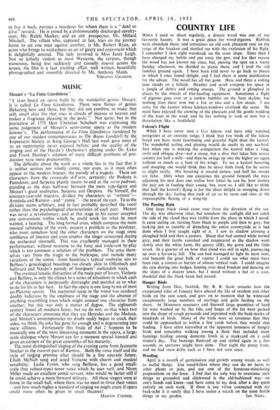MUSIC Mozart's "La Finta Giardiniera" "I ALSO heard an opera
buffa by the wonderful genius Mozart; it is called La Finta Giardiniera. There were flames of genius flickering here and there, but they did not combine to make that still, small altar fire that rises in clouds of incense to heaven and makes a fragrance pleasing to the gods." Not quite; but in the journalese of 1775 Herr Christian Schubart was expressing the same judgement of Mozart's serio-comic opera as the modem listener's. The performance of La Fink, Giardiniera (rendered by one of our staidest contemporaries as The Bogus Landgirl) by the Impresario Society at King George's Hall last week gave most of us an 'opportunity never enjoyed before; and the quality of the singing and of the Haydn's Orchestra's playing under Dr. Ucko and Frank Dunlop's solution of many difficult problems of pro- duction were most praiseworthy. The difficulty about the work as a whole lies in the fact that it is neither serious nor wholly comic, nor even, as it must often appear to the modern listener, the parody of a tragedy. There are characters from the conunedia dell'arte, certainly; the Podesta is Pantaloon, and Serpetta plainly means to end as the serva padrona, standing as she does half-way between the mere type-figure and Mozart's great soubrettes, Susanna and Despina. He himself, the nineteen-year-old maestro, divined the characters as "serious"— Armincia and Ramiro—and "comic"—the rest of the cast. To us the division seems arbitrary, and in fact probably described the vocal rather than the psychological characteristics of each part. Mozart was never a revolutionary, and at this stage in his career accepted any conventions within which he could work for what he most wanted, a hearing. The long formal arias, which compose the main musical substance of the work, present a problem to the producer, who must somehow lend the other characters on the stage some semblance of interest and even employ the singer concerned during the orchestral ritornelli. This was excellently managed in these performances, without recourse to the fussy and irrelevant by-play which is too common a solution of the problem. The arias them- selves vary from the tragic to the burlesque, - and include many variations of the comic—from Sandrina's typical soubrette airs to Belfiore's genealogical boastings (so closely akin to Offenbach and Sullivan) and Nardo's parody of foreigners' outlandish ways. The eventual lunatic distraction of the main pair of lovers, Violante and Belfiore, is only the climax to a series of situations in which each of the characters is perpetually distraught and puzzled as to what to do for his or her best. In fact the opera is one long hymn of most un-Platonic aporia. The nocturnal scene in the wood was rendered doubly ludicrous by the smallness of the stage and the absence of anything resembling trees which might conceal one character from another; but this was only a matter of degree. The eighteenth century found all madness funny, but we do not; so that when two of the characters announce that they are Hercules and the Medusa, and Mozart's contemporaries no doubt really began to crack their sides, we think the joke has gone far enough and is degenerating into mere silliness. Fortunately this finale of Act 2 happens to be musically one of the most interesting moments in the opera, a large- scale dialogue where Mozart can for a moment spread himself and gives an earnest of the great ensembles of his maturity. The most distinguished singing of the evening came from Jeannette Sinclair in the travesti part of Ramiro. Both the voice itself and the style of singing promise what should be a fine operatic future. Eilidh McNab sang and acted Violante with charm and musical sensibility. Leslie Fyson, who sang Belfiore, has a good small- scale (but robust-type) tenor voice which he uses well, and Niven Miller made an excellent comic servant, who would be better still if he could achieve a more forward delivery. All these singers were at home in the small hall, where there was no need to force their voices —and how much higher a standard of singing we might enjoy if opera could more often be given in small theatres!
MARTIN COOPER.


































 Previous page
Previous page